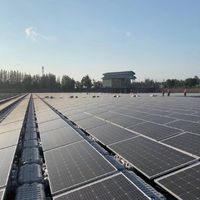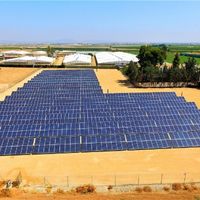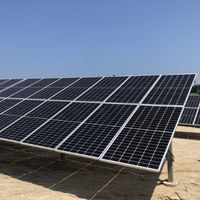2022.Sep
28
ÓĖéÓ╣ēÓĖŁÓĖłÓĖ│ÓĖüÓĖ▒ÓĖöÓĖŻÓĖ▓ÓĖäÓĖ▓Ó╣äÓĖ¤ÓĖ¤Ó╣ēÓĖ▓ÓĖéÓĖŁÓĖćÓĖ¬ÓĖ½ÓĖĀÓĖ▓ÓĖ×ÓĖóÓĖĖÓ╣éÓĖŻÓĖøÓĖĪÓĖĄÓĖ£ÓĖźÓĖüÓĖŻÓĖ░ÓĖŚÓĖÜÓĖłÓĖ│ÓĖüÓĖ▒ÓĖö
Germany cancels household photovoltaic tax to stimulate photovoltaic storage capacity News on September 20, according to foreign media reports, the German cabinet passed the 2022 tax bill, canceling the income tax on household photovoltaics (the scope of application includes single-family houses below 30kW and multi-family houses and apartments below 15kW), as well as households and photovoltaics. VAT on photovoltaic systems in public buildings. In addition, the proposal also proposes to reduce the value-added tax on natural gas transportation. The above regulations will be implemented from the beginning of 2023. Stimulating household optical storage machines, the market demand increases After the abolition of income tax and value-added tax, the economics of rooftop photovoltaics will be improved. From 2023 onwards, Germany will exempt income tax and corresponding value-added tax for qualified rooftop photovoltaics. The general income tax rate is 14%-15%. After the cancellation, the economy will be improved, stimulating the rapid growth of Germany's rooftop photovoltaics and energy storage. In addition, eliminating the tax also simplifies the process by eliminating the cumbersome process of applying for tax deductions. Residential electricity prices in Germany may rise in Q4, which will stimulate household solar storage installations. In 2021, the electricity price for German residents will be 0.32 euros/kWh, rising to 0.37 euros/kWh in the first half of 2022. Due to the impact of energy shortages, it is expected that electricity prices for German residents will remain high in Q4 2022 and 2023, which will greatly stimulate installed capacity demand. As the world's largest household storage market, Germany's household solar storage has huge growth potential. According to the forecast of an analyst at the New Energy Research Center of TrendForce, the newly installed capacity will reach 12GW in 2023. From January to July 2022, the newly installed capacity in Germany is about 3.7GW, a year-on-year increase of 15.6%. In response to the energy crisis, Germany has made a series of adjustments to its energy planning. By 2030, the proportion of renewable energy generation will be raised from 65% to 80%. In addition to Germany, the European photovoltaic market has maintained a high degree of prosperity after the geopolitical conflict and energy crisis, and the bidding capacity of photovoltaic, wind power and other projects has been greatly increased. It is expected that by 2023, the installed capacity demand in Europe will be further released, and the newly installed capacity demand will reach 73GW. In this context, it is predicted that my country's photovoltaic product exports will usher in a greater growth. ÓĖŚÓĖĄÓ╣łÓĖĪÓĖ▓: ÓĖĢÓ╣ēÓĖÖÓĖēÓĖÜÓĖ▒ÓĖÜÓ╣éÓĖöÓĖó EnergyTrend ÓĖéÓĖŁÓĖć TrendForce New Energy Network
ÓĖŁÓ╣łÓĖ▓ÓĖÖÓ╣ĆÓĖ×ÓĖ┤Ó╣łÓĖĪÓ╣ĆÓĖĢÓĖ┤ÓĖĪ









